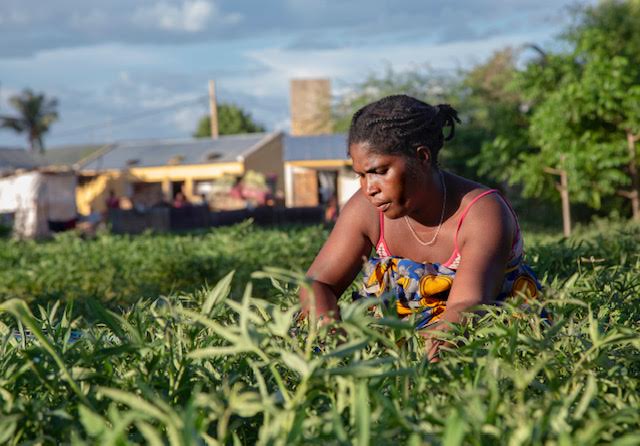
CRS’s Rice Bowl Helps Feed 159 Million in 100 Countries
WINDSOR TERRACE — Madagascar is an island nation off the African continent’s east coast. But even though water surrounds it, this country is not immune from drought.
Families rely on small farms and gardens to grow their food, but harvests shrink in the dry years. Consequently, one in two children on the island is undernourished, according to Catholic Relief Services, which aims to change that.
CRS’s annual Lenten Rice Bowl program helps fund efforts that teach islanders how to help their soil retain more water. They also learn to rotate crops and other sustainable techniques.
“It’s what I call ‘best practices,’ ” said Bishop Frank Caggiano of the Diocese of Bridgeport, Connecticut. “This is where, I think, CRS is making a profound difference. As Catholic Christians, we talk about protecting life; it starts in the womb, and it stays with us in every fabric of our natural lives. Well, this is part of that.”
According to CRS, donations to Rice Bowl help 159 million people in more than 100 countries.
This year, CRS Rice Bowl highlights its work in Madagascar, El Salvador, and Timor-Leste, a new nation founded in 2002 on the island of Timor, north of Australia.
For example, back in Madagascar, Valerie Aimee Raharisoa, 32, tends a garden on land her family has used for generations. Family members help each other manage their plots. The mother learned new methods to grow vegetables through Rice Bowl-funded programs, which gave her harvests a boost. In an interview shared by CRS, she expressed pride in how her garden helps her children avoid malnutrition.
“What makes me happy is when I go to my garden, and I see all the things that I’ve planted grow,” she said. “When I see flowers or the greens or when I see the first seeds sprouting, it’s like I’ve transferred a kind of power from my hands to the plants.”
The U.S. Conference of Catholic Bishops created CRS in 1943 to be an agile humanitarian organization to help people in long-term crises, such as drought, and sudden emergencies like hurricanes or earthquakes. The USCCB has conducted the Rice Bowl project through CRS since 1977.
Bishop Caggiano is a native of Brooklyn and a former auxiliary bishop for the Diocese of Brooklyn. He currently serves as chairman of the CRS board for the USCCB.
He said this year’s Rice Bowl carries added urgency because donations in 2020 fell 47 percent below previous years. The COVID-19 pandemic gets the blame, he said.
CRS records show the average total donations over the past five years were $11.5 million, with about $8.6 million for food programs worldwide and $2.9 million to help food ministries in the U.S. diocese. According to CRS’s preliminary estimates, 2020 yielded about $5.3 million.
“This year,” Bishop Caggiano said, “life is not back to normal, but the hope is people would still participate in the Rice Bowl project because it gives them the opportunity to help fund needs all over the world.”
As in years past, CRS provides materials on its website (crsricebowl.org) to help people of all ages use Rice Bowl activities to enhance their Lenten observances. Included is the opportunity to donate alms to help fund CRS food programs around the world.
“Prayer, fasting, and almsgiving are the three disciplines to prepare for Easter, so it makes sense,” Bishop Caggiano said.
Father Charles Keeney guides Rice Bowl efforts for the Diocese of Brooklyn. He is director of the Propagation of the Faith for the diocese, which gives him a unique perspective on the annual Lenten program’s effectiveness.
“As far as I’m concerned, the two things really go hand-in-hand,” he said of building the faith and the CRS efforts. “Both help the Church with corporal or spiritual works of mercy. But the actual Rice Bowl program is major because it does help CRS, in particular, with food programs.”
Father Keeney said 75 percent of Rice Bowl proceeds fund food programs in about 100 countries outside the U.S. The other 25 percent goes to domestic efforts. Recently, Father Keeney sent $500 checks from Rice Bowl to 11 food ministries in the diocese.
And, Bishop Caggiano said, giving alms adheres to the Gospel verse Matthew 25:40 — “whatever you did for one of these least brothers of mine, you did for me.”
“The people in these countries are grateful for whatever CRS does,” the bishop said, “but they learn, and they pass it on to others, and that’s our Catholic faith doing that.
“The Lord has asked us to do it, and with his grace, it will have a profound impact.”
Father Keeney confirmed that most people helped by CRS are not Catholic, which concerns some people.
“Some complain, ‘You’re helping Muslims, or Hindus, or whoever,’ ” he said. “But we don’t help people because they are Catholic.
“We help people because we’re Catholic.”

When I was hungry, you gave me to eat – says the Lord.